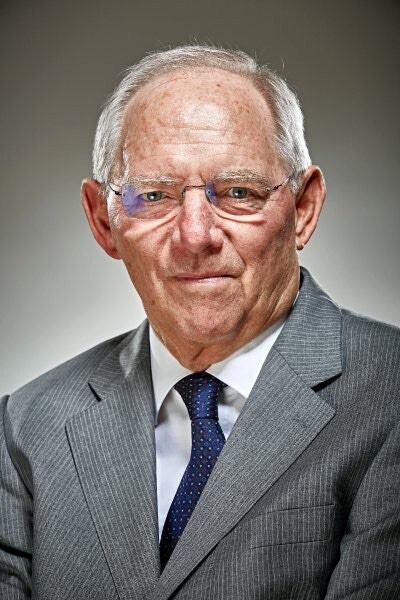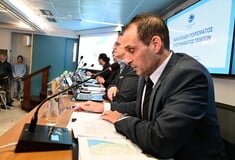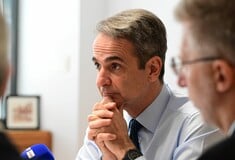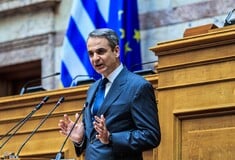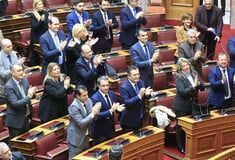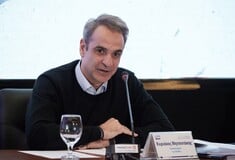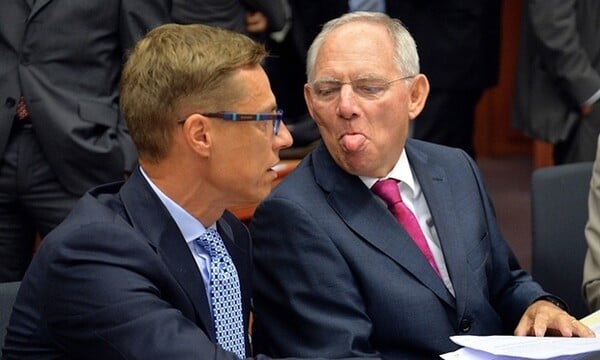
Toυς λόγους για τους οποίους δεν έχει λογαριασμό στο Twitter εξηγεί στη συνέντευξή του στο περιοδικό «Der Spiegel» ο Βόλφγκανγκ Σόιμπλε.
"Τα μηνύματα στο Twitter είναι βραχύβια για αυτό το λόγο τα βρίσκω πληκτικά", ανέφερε χαρακτηριστικά.
"Την περασμένη εβδομάδα, ήσασταν μεταξύ εκείνων που αναφέρθηκαν συχνότερα στο Twitter. Δεκάδες χιλιάδες χρήστες σας κατηγορούσαν ότι κάνατε πραξικόπημα εναντίον της Ελλάδας. Έχετε πληγωθεί από αυτές τις κατηγορίες;" τον ρώτησε ο δημοσιογράφος του γερμανικού περιοδικού.
"Το πήρα πολύ ψύχραιμα. Το e-mail μου επίσης γέμισε και το 90 % των μηνυμάτων υποστήριζαν την άποψή μου. Δεν έχει τύχει ποτέ να συμφωνούν τόσοι πολλοί μαζί μου. Παρόλα αυτά, όταν πρόκειται για την Ελλάδα, υπάρχουν εξαιρετικά περίπλοκα ζητήματα, για τα οποία δεν υπάρχουν απλές απαντήσεις", είπε ο Σόιμπλε.
Eνδιαφέρον παρουσιάζει και η απάντηση του γερμανού υπουργού Οικονομικών στην επισήμανση του δημοσιογράφου ότι "κατά τη διάρκεια των διαπραγματεύσεων, φάνηκε σαν τον αυστηρό πατέρα που προσπαθεί να επαναφέρει στην τάξη κακομαθημένα παιδιά.
"Είναι θέμα ισορροπίας. Στο σπίτι μου, ήμασταν τρία αδέρφια, και όταν τσακωνόμασταν, ο πατέρας μας, έλεγε πάντα ότι ο πιο δυνατός είναι αυτός που πρέπει να υποχωρεί. Και αυτό ακριβώς συνέβη στις διαπραγματεύσεις με την Ελλάδα. Αυτός που βρίσκεται σε καλύτερη θέση πρέπει να προσπαθεί να βοηθήσει τον πιο αδύναμο. Προσπάθησα να το πράξω" απάντησε ο Σόιμπλε.
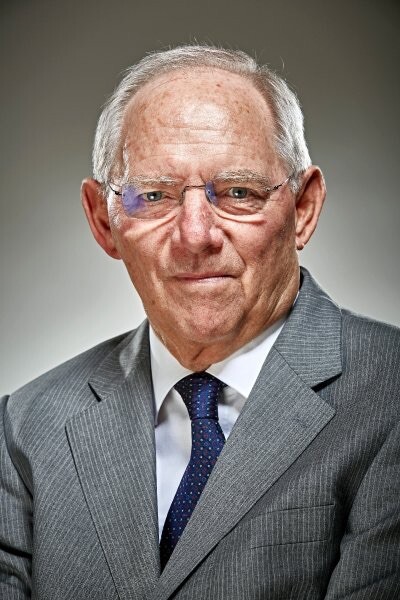
Ολόκληρη η συνέντευξη στα αγγλικά:
SPIEGEL: Mr. Minister, do you have a private Twitter account?
Schäuble: No. As a rule, Twitter messages are very short-lived, which is why I find them uninteresting.
SPIEGEL: Recently, though, Twitter users have been extremely interested in you. Last week, you were among those mentioned most often on Twitter. Tens of thousands accused you of having launched a putsch against Greek democracy with the new aid program. Are you hurt by such accusations?
Schäuble: I took it quite calmly. My email account was also completely stuffed, and 90 percent of them were expressions of opinion that supported me. I have never experienced such a flood of agreement. Still, when it comes to Greece, there are highly complex questions for which there are no simple answers.
SPIEGEL: Europe intends to solve the problem with a new loan package worth more than €80 billion ($87 billion). Is that the right answer?
Schäuble: A half a year ago, Greece was preparing to return to the capital markets. Today, the country's economy lies in ruins. That is the Greek government's responsibility. But we cannot abandon the people of Greece. That is why a new program was needed, even if means new hardships for the population. More than anything, though, the question is: What is the better solution for Europe?
SPIEGEL: The American economist Paul Krugman has a clear position on that. The new aid program for Greece, he wrote in a recent column in the New York Times, is "pure vindictiveness" and a "complete destruction of national sovereignty." Do you share his view?
Schäuble: Krugman is a prominent economist who won a Nobel Prize for his trade theory. But he has no idea about the architecture and foundation of the European currency union. In contrast to the United States, there is no central government in Europe and all 19 members of the euro zone must come to an agreement. It appears Mr. Krugman is unaware of that.
SPIEGEL: During the negotiations last weekend, a paper appeared from your ministry proposing that Greece leave the euro zone for a limited period of time. What were you hoping to achieve with this proposal?
Schäuble: We never said that Greece should leave the euro zone. We only called attention to the possibility that Athens itself can decide on taking a timeout. Debt relief is not possible within the currency union. European treaties do not allow it.
SPIEGEL: The governments in France and Italy would seem to have a different view. They sharply criticized your proposal because they want to keep Greece in the euro zone at all costs. Did you go too far?
Schäuble: Your portrayal is not consistent with the facts. Even my Italian counterpart Pier Carlo Padoan admitted: In the decisive meetings, 15 euro-zone members backed the German position. Only France, Italy and Cyprus were of a different opinion.
SPIEGEL: Italy and France, though, are founding members of the European Union. Shouldn't Germany pay particularly close attention to pursuing a common position with these countries?
Schäuble: It isn't unusual for the positions of France and Germany to not be completely consistent. It is also sometimes the case that my wife and I aren't entirely of the same opinion. We aren't even married to France, but Germany and France nevertheless overcame their differences in the end. Without Germany and France, it doesn't work. That is what matters.
SPIEGEL: Chancellor Angela Merkel's coalition government also had a difficult time overcoming its differences. You have said that your paper was cleared with the Social Democrats (SPD), Merkel's center-left coalition partner. But SPD head Sigmar Gabriel claims that he had been informed of the proposal, but did not agree with it. Who is right?
Schäuble: The incident has been sufficiently cleared up. But I will add the following: Every party has its own problems. And in a coalition government, you show consideration for the other. You should not try to solve your own problems by making inaccurate accusations against others.
SPIEGEL: Germany took on a leadership role in the negotiations with Greece -- and adopted a "very patronizing tone," as European Parliament President Martin Schulz lamented. Does it worry you that people across Europe are talking about a "new German dominance?"
Schäuble: There is no German dominance. Germany is in a good position economically, that is undeniable. But in contrast to France and Great Britain, Germany is not a member of the United Nations Security Council. For that reason alone, you cannot talk about being in a position of political supremacy. Still, the balance in Europe has shifted since the fall of the Iron Curtain. Baltic countries, Slovakia and Slovenia also now speak up when they don't like the positions taken by others.
SPIEGEL: You mean, there is a new division in the euro zone -- between the north and the south.
Schäuble: That is inaccurate. What is important is the fact that many euro countries have now left the emergency aid program and have experienced a positive economic development: Portugal, Ireland, Spain, even Cyprus. Even Greece had gained traction by the end of last year, such that we can accurately say today: We have successfully stabilized the euro zone.
SPIEGEL: The new program for Greece calls for the Athens government to adhere to its creditors' demands down to the last comma in the coming years and for it to be closely monitored from abroad. Is Greece becoming a euro-zone protectorate?
Schäuble: No. For the most part, the elements of the new program were agreed to back in 2010. They were just never implemented, unfortunately. Thus far, the Greek economy and society have hardly developed in the desired direction. What has dramatically changed since the beginning of the year, however, is the need for additional financing. According to the most conservative estimates, that need is now at least €80 billion. For many people, that is an unimaginable sum.
SPIEGEL: Some €50 billion of that is to be generated via the privatization of assets owned by the Greek state, by way of a trust fund that will be supervised by the euro zone. Many in Greece see that as yet another attempt to turn the country into a kind of colony.
Schäuble: That is nonsense. The idea was that of finding some way to establish a broad foundation for the financing of a future program. When we talked about it on Sunday evening, I told Greek Finance Minister Euclid Tsakalotos: It's not about hurting you, but about collecting the necessary financial means. Otherwise, the debt load is unsustainable. And without that, it won't work.
SPIEGEL: Tsakalotos' predecessor, the enigmatic economics professor Yanis Varoufakis, had a different theory. He claimed that you have wanted for months to push Greece out of the euro zone so as to set an example. Is there something to that?
Schäuble: No. But I can't just focus on making it through a night of negotiations. It also isn't enough to get past the next six weeks. The real question is: How can I find a solution that is sustainable in the long term. We have to protect and further solidify the foundation of the currency union. My grandmother used to say: Benevolence comes before dissoluteness. There is a kind of generosity that can rapidly produce the opposite of what is intended.
SPIEGEL: During the negotiations, it seemed as though you were the strict father trying to bring spoiled children to reason.
Schäuble: It's about balance. At home, we were three brothers, and when we fought, my father always said that the stronger one should back down. And that's how it was in the Greece negotiations. The one in the better position must try to help the weaker one. I tried to do that.
SPIEGEL: Our impression was more that you were tirelessly negotiating over every tiny detail.
Schäuble: Everyone only has limited abilities, but you have to try to do your best. You have to be aware of that so that you attain the necessary degree of composure. As you see, I am close to reaching the point where I mellow with age.
SPIEGEL: Can a program work even though Prime Minister Alexis Tsipras says he doesn't believe in it?
Schäuble: That is the question. Previously, Tsipras rejected a similar program and then he campaigned for a "no" in the referendum, a position that a large majority supported. Now he wants to do the opposite of what he once supported. One can indeed be doubtful. But for now, I trust the assurances of Mr. Tsipras, as is only fair. He has promised to implement the program even though he doesn't believe in it. So, we'll see.
SPIEGEL: The new program has tightened the conditions. Pensions are to be reformed, taxes increased and the labor market liberalized. Why do you think that the medicine that hasn't worked for five years will now suddenly help?
Schäuble: The problem is that for the last five years the medicine has not been taken as prescribed. That's why it is now important that those measures agreed to long ago are now implemented. In December, the troika made clear that Greece still hasn't tackled 15 important reforms. That must finally change.
SPIEGEL: Could it be that you don't actually believe that the reforms will be implemented?
Schäuble: No, otherwise we wouldn't have had to travel to Brussels. But that is exactly the reason why we need those controls of which you earlier said they would patronize the Greek people.
SPIEGEL: It is more a question of whether the reforms are too much for the country. The economy has caved in, unemployment stands at 25 percent and the healthcare system is approaching collapse. The country cannot deliver what you are demanding.
Schäuble: I see things differently. In 2009, Greece had a budget deficit of 15 percent and a current accounts deficit of the same magnitude. Both indicators show that the country was living beyond its means and that there was a significant need for reform. Greece is still paying for a public administration that is among the leaders in Europe in terms of the ratio of its cost to economic output. The country has pension expenditures that are far above European standards. That has to be addressed, step by step. And by the way, that worked in all crisis countries, just not in Greece.
SPIEGEL: Still, Ireland, Spain and Portugal all suffered. And Cyprus still is suffering.
Schäuble: I am not claiming that everything is easy, but you have to start with the restructuring and carry it through to the end. Those countries did that. Since the 1990s, Baltic countries and countries in Central Europe have also been remarkably successful. We in the euro zone are on a real path to success, and it is much more sustainable than it is, for example, in many developing economies. The decision-making process in Europe is much more complicated than it is in any nation state, yet the euro zone -- aside from Greece -- is in much better shape than many countries that sometimes wrinkle their noses at us.
SPIEGEL: Is it not so that the euro, as it is currently constituted, divides Europe more than it brings the Continent together?
Schäuble: No, it doesn't. It does, however, show that European unity is never easy. It is true that Europe is cumbersome, bureaucratic and complicated. I hear that all the time, particularly in America. I respond by asking the critics whether they have a better idea for bringing together 28 countries that fought against each other for centuries. But they never have an answer.
SPIEGEL: Given the problems that have plagued the implementation of reforms in Greece, do you think a Grexit remains a possibility?
Schäuble: Austrian Chancellor Werner Faymann said it could happen at any time.
SPIEGEL: We want to know what you think.
Schäuble: (laughs) Everything that needs to be said about that has also already been said.
SPIEGEL: The debate over Greece's debt load has been continuing for five years now. But policymakers seem not to have taken a single step closer to a solution. What conclusions do you draw from that?
Schäuble: We have to expand the competencies of the economic and currency union. The five presidents of the European institutions recently submitted their proposals. In the coming months, this will provide a basis for discussing what can be done to make the euro zone more stable.
SPIEGEL: What exactly do you envision?
Schäuble: We have to again generate more faith in the euro -- not just on the financial markets, but also among the populace. We also have to strengthen regulations pertaining to healthy state finances and ensure that they are adhered to. To do so, we must change the European treaties in the medium term, which is difficult. Many shy away from doing so because they are afraid that further steps toward integration would be rejected by their people or parliaments.
SPIEGEL: What, exactly, is so complicated?
Schäuble: We are currently seeing that a currency union without political union cannot function without complications. So we have to move further toward establishing a political union, for example by strengthening the European Commission and the European Parliament. But that means that member states must give up even more sovereignty. They have already taken this step when it comes to monetary policy, but are they also prepared to transfer financial policy competencies, for example, to the European level? Many have a problem with that.
SPIEGEL: French President François Hollande has proposed installing a euro-zone finance minister and placing him or her under the supervision of a euro-zone parliamentary body.
Schäuble: I am also in favor of a euro-zone finance minister, but to install one, the European treaties must be amended first. I was pleased to hear from President Hollande that France is now prepared to do so.
SPIEGEL: Are you pleased that suddenly everyone in Europe is in favor of increased integration?
Schäuble: Of course, but I am also aware that the experiences of recent years have not made it easier to advocate for more Europe. Still, I'm not giving up. I am a realist, which is why I am unable to assert that we can only save the euro if we amend the treaties. We may have to do without. What is essential is that rules are followed and enforced. But when we do that, then we are accused of establishing a protectorate or abolishing democracy. That is all nonsense.
SPIEGEL: In recent weeks, it has become apparent that you and the chancellor were not always of the same opinion when it comes to Greece. Was that a coordinated game of role-playing?
Schäuble: The chancellor and I do not engage in role-playing games. That isn't the chancellor's style nor is it mine. Everyone has their convictions. During the 1999 European election campaign, I was head of the Christian Democratic Union and Ms. Merkel was my general secretary. We had a poster showing both of us and it read: "Not always of the same opinion, but on the same path." That's how it has remained until today, even if our roles have changed. You don't need to worry about it.
SPIEGEL: The governing coalition would have a problem if the chancellor and her most important minister had divergent opinions on a question of such great import as aid to Greece.
Schäuble: Divergent opinions are a part of democracy. In such a case, you jointly hash out a solution. In that process, everyone has a role to play. Angela Merkel is chancellor and I am the finance minister. Politicians' responsibilities come from the offices they hold. Nobody can coerce them. If anyone were to try, I could go to the president and ask to be relieved of my duties.
SPIEGEL: Are you thinking of doing so?
Schäuble: No. Where did you get that idea?


